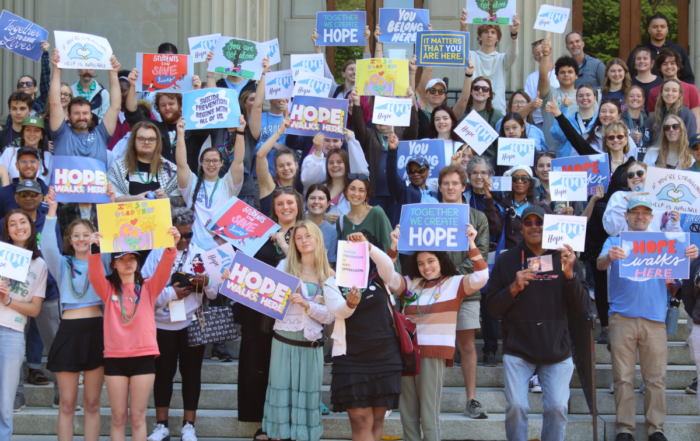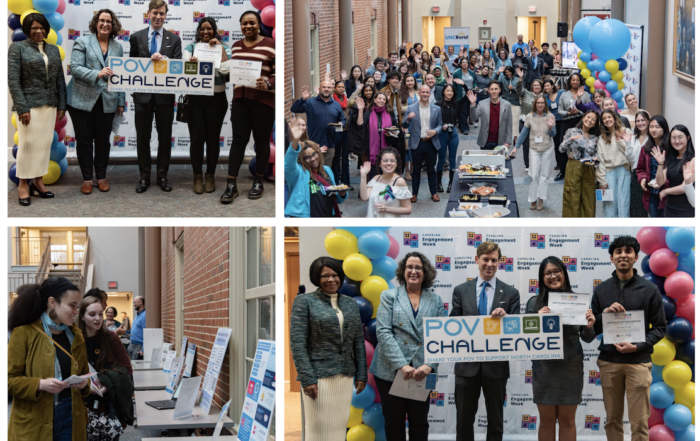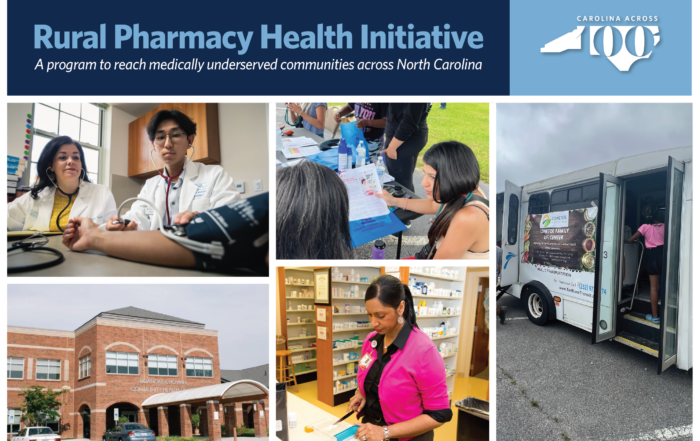Students
Reflections from Susanna Pradhan
ANTH 395 students reflect on their engagement with “Our State, Our Work”
by Susanna Pradhan
September 18, 2023
A Student’s Guide to Thriving in Carolina Across 100’s (CX100) Course: Top Tips from a Seasoned Tar Heel
Are you ready to embark on a service-learning adventure like no other? I’ve learned some valuable lessons participating in Carolina Across 100’s course and I’m sharing my top tips for students.
First, let’s cover the basics.
What is ANTH 395?
ANTH 395 “Research in Anthropology: Carolina Across 100” is an experiential learning course that connects students with North Carolina community teams who are focused on supporting Opportunity Youth in North Carolina. Enrolled students work with selected community collaboratives representing nearly 60,000 Opportunity Youth, individuals aged 16-24 who are not enrolled in academic institutions or employed.
Students gain real-world experience as interns supporting program managers in developing projects to empower Opportunity Youth. At the beginning of the semester, students and managers collaborate to complete a Student Learning Agreement (SLA) that outlines goals, responsibilities, and learning outcomes tailored to both the team’s needs and the student’s interests. During the semester, students assist program managers in developing projects for their site(s). These projects include tasks such as fact-finding, connecting county projects to UNC’s resources, and facilitating cross-team information sharing with other collaboratives across the state.
This unique course provides a meaningful and practical learning experience for students while making a positive impact on the lives of Opportunity Youth in North Carolina. “Our State, Our Work” serves as a bridge between academia and the community, empowering students to actively engage in their local communities and contribute to addressing real-world challenges. Through the combination of academic learning and practical engagement, ANTH 395 not only benefits the North Carolina Opportunity Youth population but also equips students with valuable skills and experiences that will serve them well beyond the classroom.
Now, let’s dive into tips for student success:
Tip #1: Plan Ahead and Communicate Effectively
Proactive project planning and clear communication helped me, as a student, to better serve the community team through reciprocal work. By being proactive and maintaining effective communication channels, such as bi-weekly Zoom meetings, email correspondence, and shared Google documents, I was able to ensure accountability and efficiency in our collaborative efforts. This allowed me to contribute effectively to the team’s goals, address challenges promptly, and seek feedback from the community team. This reciprocal approach fostered trust and understanding, leading to a more impactful partnership and positive outcomes for the community.
Tip #2: Establish Rapport with Your Team
Take every opportunity to connect with your team members in person or beyond scheduled meetings. Attend the CX100 in-person learning forums on UNC’s campus. Building meaningful relationships with your team strengthens your dedication and commitment to the project. Stay updated with the latest information and important dates by following the CX100 community-wide newsletters.
Tip #3: Use Your Strengths
Once you understand the goals and specific needs of your team, leverage your existing skills and strengths to support your team. Each student brings unique abilities to the table, and the community teams recognize this!
For example, I provided social media campaign strategies and designed engaging flyers to increase program visibility and recruit more Opportunity Youth. Don’t hesitate to apply other skills such as project planning, research, data analysis, marketing, and communication to support your team’s goals.
Unsure of your skills? Look at your resume or make a list of what makes you exceptional. Then, find ways to align them with your team’s needs.
Tip #4: Challenge Yourself
While your strengths allow you to complete tasks comfortably, don’t shy away from challenging yourself. Use this course as an opportunity to learn and grow by working with unfamiliar people, places, or tasks. Reflect on this in your SLA. If you’re used to an urban setting, consider partnering with a rural community. If public speaking makes you nervous, volunteer to lead group meetings. It’s okay to make mistakes; practice makes progress!
Tip #5: Advocate for Yourself
As you begin working with your team, you may come across new skills (e.g., qualitative research, storytelling techniques, data visualization, statistical analysis, digital marketing techniques) that you’d like to explore. Even if they don’t exactly line up with your initial plans, don’t dismiss them! Run it by your team and see what they say. Chances are, they’re just as excited about it as you are and want to support you.
For example, during my semester with CX100, I wanted to incorporate user experience (UX) research into my work with my team, but I wasn’t sure how. I asked the course instructor who validated my ideas and helped refine them while ensuring they aligned with my team’s vision. While I ultimately wasn’t able to pursue this side project due to time constraints, advocating for myself and seeking input from my professor and community team allowed me to explore new possibilities and enhance my learning experience.
Tip #6: Reflect and Learn from Challenges
Service-learning can come with its fair share of challenges, from navigating team dynamics to managing time constraints. It’s important to reflect on these challenges and learn from them. Take the time to assess what went well, what didn’t, and what you can do differently moving forward.
For instance, my team faced some setbacks while planning a career summit event in Bertie County, which affected our overall project progress. Instead of stressing and rushing to meet the deadline, we changed the event date and adapted to a new timeline. Through open communication and reflection, we were able to overcome the challenges and improve our teamwork and maximize our project outcomes.
Tip #7: Embrace the Impact
Finally, embrace the impact that your work can have on the community! Remember that the goal of CX100 is to empower Opportunity Youth and make a positive difference in their lives. Take pride in the work you’re doing and the contributions you’re making. Celebrate the successes, big and small, and appreciate the meaningful connections you’ve made with your team and the community.
ANTH 395 was a transformative experience for me, and I hope these tips help you make the most out of your own service-learning adventure!

Susanna Pradhan participated with “Our State, Our Work” during her senior at UNC-Chapel Hill while majoring in Global Studies and Anthropology.







